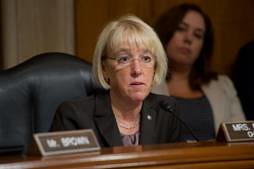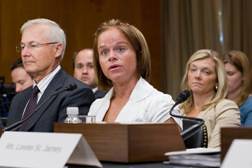FOR IMMEDIATE RELEASE Contact: Murray Press Office
Wednesday, July 27, 2011 (202) 224-2834
VETERANS: Senator Murray Chairs Hearing to Examine the Human and Financial Costs of War
Hearing shines a light on the often overlooked long-term costs that must be paid to support veterans and their families and how we must protect and plan for this lifetime of care in the current budget climate

Chairman Murray gives opening remarks during today’s Senate Veterans’ Affairs Committee hearing on the human and financial cost of war.
· WATCH the hearing
· The full text of witness testimonies can be viewed here.
· Senator Murray’s opening statement MP3 audio file can be found here.
· Crystal Nicely’s opening testimony MP3 audio file can be found here.
(Washington, D.C.) – Today, U.S. Senator Patty Murray, Chairman of the Senate Veterans’ Affairs Committee, held a hearing to examine the real human and financial costs of the Wars in Iraq and Afghanistan and how as a nation we need to plan to keep our promise to these veterans for the rest of their lives.
“As we all know, when our nation goes to war, it’s not just the costs of fighting that war that must be accounted for. We must also include the cost of caring for our veterans and families long after the fighting is over,” said Senator Murray. “No matter what fiscal crisis we face, no matter how divided we may be over approaches to cutting our debt and deficit, and no matter how heated the rhetoric here in Washington D.C. gets - we must remember that we can’t balance our budget at the expense of the health care and benefits our veterans have earned. The commitment we have to them is non-negotiable.”

At the hearing, Senator Murray heard from Crystal Nicely, the wife of Marine Corporal Todd Nicely, a quadruple amputee veteran of the War in Afghanistan. Nicely described the lifetime of support her and her husband will require and about the red tape she has already faced in her daily struggle to provide Todd with the care he needs. She also discussed their continued frustration over the lack of consistent care and attention her husband has received.
The Senator also heard testimony from Paul Rieckhoff, the Executive Director and Founder of Iraq and Afghanistan Veterans of America (IAVA). Rieckhoff outlined the high unemployment rate for new veterans and highlighted the wide range of specific skill sets they hold that translate to civilian trades. Reickhoff also called on the public, private and nonprofit sectors to work together in order to ensure returning servicemembers are able to easily transition into the American workforce.
Finally, the hearing featured the views of budget experts from the Congressional Budget Office, the Government Accountability Office and the RAND Corporation on the long-term costs associated with providing mental and physical health care, supporting caregivers, maintaining prosthetics, and providing benefits.
The full text of Senator Murray’s opening statement follows:
“Welcome to today’s hearing, where we will examine the lifetime costs of supporting our newest generation of veterans. As we all know, when our nation goes to war, it’s not just the costs of fighting that war that must be accounted for. We must also include the cost of caring for our veterans and families long after the fighting is over.
“And that is particularly true today, at a time when we have more than half-a-million Iraq and Afghanistan veterans in the VA health care system– an over 100% increase since 2008.
“This presents a big challenge - and one that we have no choice but to step up to meet if we are going to avoid many of the same mistakes we saw with the Vietnam generation. But it’s more than just the sheer number of new veterans that will be coming home that poses a challenge to the VA.
“It’s also the extent of their wounds – both visible and invisible – and the resources it will take to provide our veterans with quality care.
“Through the wonders of modern medicine, service members who would have been lost in previous conflicts are coming home to live productive and fulfilling lives. But they will need a lifetime of care from the VA.
“Today, we will hear from the Congressional Budget Office, the Government Accountability Office, the RAND Corporation and Iraq and Afghanistan Veterans of America, in an effort to help us quantify and understand those costs, and to ensure that we can meet the future needs of our veterans.
“But today’s hearing is also important to better understanding the social and economic costs borne by veterans and their families. And today we are so fortunate to be joined by one of those brave family members - Crystal Nicely - who is not only a wife but also a caregiver to her husband, Marine Corporal Todd Nicely.
“Todd was seriously injured by an I.E.D. in the southern Helmand Province of Afghanistan and since that time has come home to fight every day, focus on his recovery, and I even heard yesterday that he has already started to drive again.
“I want to take a moment to say thank you so much for your service to our country. You have shown bravery not only as a Marine in Afghanistan, but also through the courage you have displayed during your road to recovery. I invited Crystal here today because I think it is incredibly important that we hear her perspective.
“The costs we have incurred for the wars in Iraq and Afghanistan – and will continue to incur for a very long time - extend far beyond dollars and cents. And when I first met Crystal last month while touring Bethesda Naval Base her story illustrated that. Crystal is here today to talk about the human cost.
“And that cost is not limited exclusively to the servicemembers and veterans who have fought and are fighting these wars, but it also is felt by the families of these heroes who work tirelessly to support their loved ones through deployments and rehabilitation – day in and day out. Many, like Crystal, have given up their own jobs to become full time caregivers and advocates for their loved ones.
“Last month, while testifying before the Senate Appropriations Subcommittee on Defense, Chairman of the Joint Chiefs of Staff, Admiral Mullen told me that ‘without the family members we would be nowhere in these wars.’ I couldn’t agree more - and after we hear Crystal’s story that will be even more clear.
“As the members of this Committee know, over the course of the last few hearings we’ve examined how the veterans of today’s conflicts are faced with unique challenges that VA and DoD are often falling short of meeting.
“We have explored mental health care gaps that need to be filled, cutting edge prosthetics that must be maintained, a wave of new and more complex benefit claims that are taking too long to complete, the need to fulfill the promise of the post 9/11 GI Bill, and the need to support veterans who are winding up out-of-work and on the streets.
“All of these unmet challenges come with costs. Some costs we will be able to calculate. Some will not be fully known for decades. But today’s hearing will be a reminder that in order to meet these costs we must safeguard the direct investments we make in veterans care and benefits, get the most value out of every dollar we spend, and start planning today – at a time when critical long-term budget decisions are being made.
“As we all know, there is no question that we need to make smart decisions to tighten our belts and reduce our nation’s debt and deficit.
“But no matter what fiscal crisis we face, no matter how divided we may be over approaches to cutting our debt and deficit, and no matter how heated the rhetoric here in Washington D.C. gets - we must remember that we can’t balance our budget at the expense of the health care and benefits our veterans have earned.
“Their sacrifices have been too great. They have done everything that has been asked of them. They have been separated from their families through repeat deployments. They have sacrificed life and limb in combat. And they have done all of this selflessly and with honor to our country. And the commitment we have to them is non-negotiable.
“Not just today, but far into the future.
“Thank you all for being here today, I will now turn to Senator Brown for his opening statement.”
###
Meghan Roh
Deputy Press Secretary
Office of U.S. Senator Patty Murray
202-224-2834
